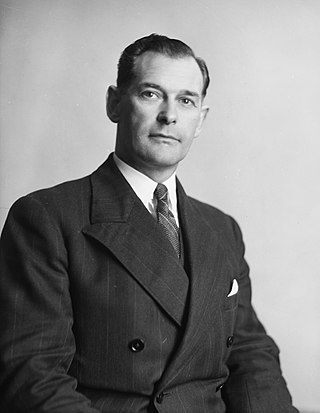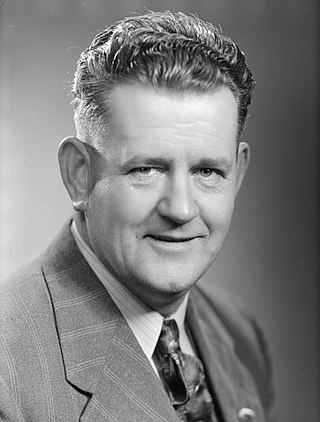| ||||||||||||||||
| Turnout | 14,377 (68.49%) | |||||||||||||||
|---|---|---|---|---|---|---|---|---|---|---|---|---|---|---|---|---|
| ||||||||||||||||
| ||||||||||||||||
The Pahiatua by-election of 1977 was a by-election for the electorate of Pahiatua on 30 April 1977 during the 38th New Zealand Parliament.
| ||||||||||||||||
| Turnout | 14,377 (68.49%) | |||||||||||||||
|---|---|---|---|---|---|---|---|---|---|---|---|---|---|---|---|---|
| ||||||||||||||||
| ||||||||||||||||
The Pahiatua by-election of 1977 was a by-election for the electorate of Pahiatua on 30 April 1977 during the 38th New Zealand Parliament.
The by-election resulted from the resignation of the previous member Sir Keith Holyoake when he was appointed Governor-General.
The Labour Party had seven candidates including: [1]
Levatt, who earned his Ph.D. from Michigan University and had previously lectured in American universities, was selected as the candidate. [1]
Five candidates were shortlisted for the National nomination. [2]
At a selection meeting in the Pahiatua Town Hall four ballots were taken of National members. Kynoch was initially the frontrunner to win the nomination and lead the voting until the final ballot which selected Falloon as the candidate. [3] [4] [5]
The Values Party selected Peter McHugh as its candidate. McHugh, a secondary school from Hastings, had stood as the Values candidate for Pahiatua in 1975. [6]
The following table gives the election results:
| Party | Candidate | Votes | % | ±% | |
|---|---|---|---|---|---|
| National | John Falloon | 9,059 | 63.01 | ||
| Labour | Allan Levett | 4,280 | 29.77 | ||
| Social Credit | Graeme Hislop | 844 | 5.87 | -3.89 | |
| Values | Peter McHugh | 194 | 1.35 | -2.18 | |
| Majority | 4,779 | 33.24 | |||
| Turnout | 14,377 | 68.49 | -16.12 | ||
| Registered electors | 20,993 | ||||
| National hold | Swing | ||||

Sir Keith Jacka Holyoake, was a New Zealand politician who served as the 26th prime minister of New Zealand, serving for a brief period in 1957 and then from 1960 to 1972, and also as the 13th governor-general of New Zealand, serving from 1977 to 1980. He is the only New Zealand politician to have held both positions.

The 1957 New Zealand general election was a nationwide vote to determine the shape of the New Zealand Parliament's 32nd term. It saw the governing National Party narrowly defeated by the Labour Party. The 1957 elections marked the beginning of the second Labour government, although this administration was to last only a single term.
The Christchurch Central by-election of 1979 was a by-election during the 39th New Zealand Parliament. It was prompted by the death of Bruce Barclay, a Labour Party MP, and resulted in Geoffrey Palmer, also of the Labour Party, being elected to replace him for the seat of Christchurch Central. Palmer would eventually go on to become Prime Minister. The by-election was somewhat embarrassing for the National Party, whose candidate was pushed into third place by Social Credit's Terry Heffernan.

The East Coast Bays by-election of 1980 was a by-election during the 39th New Zealand Parliament in the East Coast Bays electorate. It resulted in an upset for the National Party, as their candidate and future leader Don Brash was unexpectedly beaten by Gary Knapp of the Social Credit Party.
The Onehunga by-election of 1980 was a by-election for the Onehunga electorate during the 39th New Zealand Parliament. It was prompted by the death of Frank Rogers, a Labour Party MP. It was held on 7 June 1980 and was won by Fred Gerbic, also of the Labour Party.

The Rangitikei by-election of 1978 was a by-election in the New Zealand electorate of Rangitikei, a predominantly rural district in the middle of New Zealand's North Island. The by-election occurred on 18 February 1978, and was precipitated by the death of sitting National Party member of parliament Sir Roy Jack in December 1977.
Pahiatua is a former New Zealand parliamentary electorate in the Wairarapa region. It existed from 1896 to 1996, and was represented by nine Members of Parliament, including Prime Minister Keith Holyoake for 34 years.
The Timaru by-election of 1985 was a by-election for the electorate of Timaru during the term of the 40th New Zealand Parliament. It was triggered by the death of Sir Basil Arthur on 1 May 1985. Sir Basil was Speaker of the House, and had inherited the rank of baronet from his father in 1949.

Michael Connelly was a New Zealand trade unionist, politician of the Labour Party, and a Member of the Legislative Council from 1936 to 1950.
The 1954 Patea by election was held on 31 July during the 30th New Zealand Parliament, and was caused by the resignation of incumbent National MP, William Sheat.
The Marlborough by-election of 1970 was a by-election for the electorate of Marlborough, held on 21 February 1970 during the 30th New Zealand Parliament.

The 1967 Eastern Māori by-election was a by-election for the electorate of Eastern Maori on 12 August 1967 during the 35th New Zealand Parliament.

The Mangere by-election of 1977 was a by-election for the electorate of Mangere on 26 March 1977 during the 38th New Zealand Parliament. The by-election resulted from the resignation of the previous member Colin Moyle after accusations against him in parliament, and he was replaced by David Lange, also of the Labour Party. Apart from Lange, there were seven other candidates in the by-election.

The Fendalton by-election of 1967 was a by-election for the electorate of Fendalton on 15 April 1967 during the 35th New Zealand Parliament.

The Northern Maori by-election of 1963 was a by-election for the electorate of Northern Maori on 16 March 1963 during the 33rd New Zealand Parliament. The by-election resulted from the death of the previous member Tapihana Paikea on 7 January 1963. It was held the same day as the Otahuhu by-election.
The Waitaki by-election 1962 was a by-election held in the Waitaki electorate in South Canterbury and North Otago during the term of the 33rd New Zealand Parliament, on 10 March 1962. The by-election was won by Alan Dick.
The Hurunui by-election 1961 was a by-election held in the Hurunui electorate in North Canterbury during the term of the 33rd New Zealand Parliament, on 10 June 1961.

The Bay of Plenty by-election 1957 was a by-election held in the Bay of Plenty electorate in the Bay of Plenty during the term of the 31st New Zealand Parliament on 6 April 1957.

The Onehunga by-election 1953 was a by-election held in the Onehunga electorate in Auckland during the term of the 30th New Zealand Parliament, on 19 December 1953. The by-election was won by Hugh Watt of the Labour Party.

The Timaru by-election 1962 was a by-election held in the Timaru electorate in Canterbury during the term of the 33rd New Zealand Parliament, on 21 July 1962.